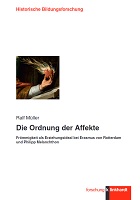Die Ordnung der Affekte
Frömmigkeit als Erziehungsideal bei Erasmus von Rotterdam und Philipp Melanchthon
Abstract
In this historical study, the educational ideal of piety, which was omnipresent in the early modern period, is systematically explored for the first time and located in the context of theology, anthropology and theories of affect. In the context of the theories of affect, the concept of piety gains depth and is made fruitful for pedagogical questions. At the same time, the theories of affect of the 16th century find their legitimate place in theological anthropology. The author analyses the foundations on which the education of affects was based in the Christian confessional context of the 16th century. The potential for emancipation becomes just as visible as immanent (self-)optimisation and pressure to conform.
Two of the most important protagonists of 16th century pedagogy are examined: Erasmus of Rotterdam and Philipp Melanchthon. At the same time, the confessional differentiation of the pedagogy of piety and the regulation of affect is brought into view. Here, the study brings to light decisive differences rooted in the respective anthropologies.
The work opens up the foundations for research into piety from a pedagogical perspective. Piety appears as a multi-layered concept with great potential for understanding the pedagogy of the 16th and 17th centuries. In der vorliegenden historischen Studie wird erstmals das in der Frühen Neuzeit allgegenwärtige Erziehungsideal der Frömmigkeit systematisch erschlossen und im Kontext von Theologie, Anthropologie und Affektenlehre verortet. Im Kontext der Affekttheorien gewinnt der Frömmigkeitsbegriff an Tiefe und wird für pädagogische Fragestellungen fruchtbar gemacht. Zugleich finden die Affekttheorien des 16. Jahrhunderts in der theologischer Anthropologie ihren legitimen Ort. Der Autor analysiert, auf welchen Grundlagen die Erziehung der Affekte im christlich-konfessionellen Kontext des 16. Jahrhunderts beruhte. Das Emanzipationspotential wird dabei ebenso sichtbar wie immanenter (Selbst-)Optimierungs- und Anpassungsdruck.
Untersucht werden zwei der wichtigsten Protagonisten der Pädagogik des 16. Jahrhunderts: Erasmus von Rotterdam und Philipp Melanchthon. Damit wird zugleich die konfessionelle Ausdifferenzierung der Frömmigkeitspädagogik und der Affektregulierung in den Blick genommen. Hier fördert die Untersuchung entscheidende, in der jeweiligen Anthropologie begründete Unterschiede zu Tage.
Die Arbeit erschließt die Grundlagen für eine Frömmigkeitsforschung aus pädagogischer Perspektive. Frömmigkeit erscheint dabei als ein vielschichtiger Begriff mit großem Potential zum Verständnis der Pädagogik des 16. und 17. Jahrhunderts.


 Download
Download Web Shop
Web Shop